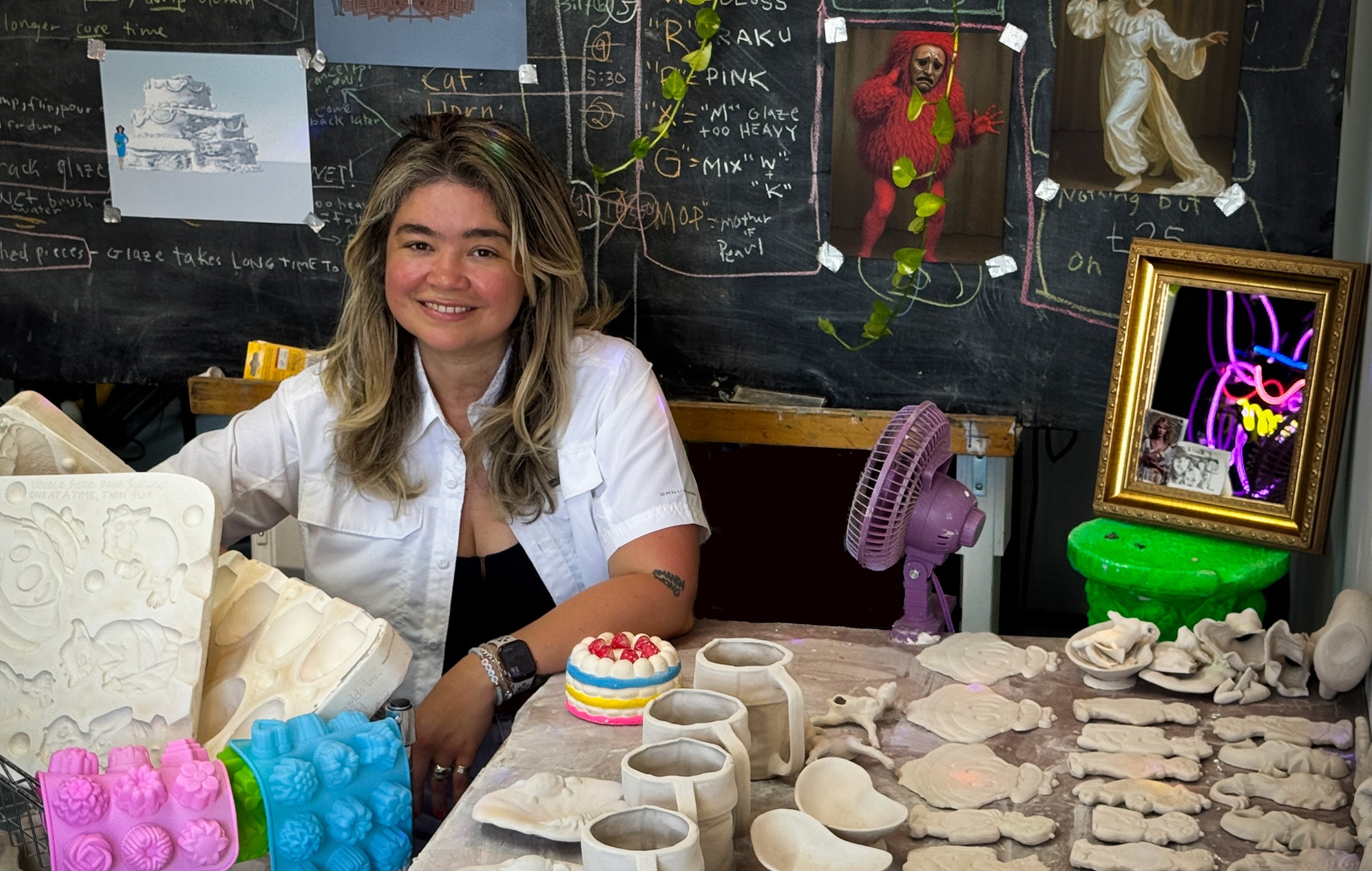
Photo by Brett Potter

Audio By Carbonatix
Miami, a city stereotyped for its reputation of perpetually seeking a dopamine rush, has undoubtedly witnessed the detrimental effects of addiction, particularly during the ‘70s and ‘80s. Tara Long, the artist behind La Esquinita (Little Corner), however, believes our addiction was spurred not in discos, but in sword-like trees and the sticky air of the sugarcane fields in the 1920s.
“This is a crazy one,” Long tells New Times about her latest installation, on display at Locust Projects through January 17. “This is my first solo show, and it will give me a chance to work on the whole brain. It’s a big ‘ol endeavor. I went super ambitious; I didn’t even mean to.”
With La Esquinita, Long explores the past and present booms of national and multinational businesses localizing in Miami, beginning with sugar corporations growing sugarcane in the Caribbean and South Florida. Long tethers that sugar high to the rise of Miami’s tech sector. She cites Apple planting its flag in Coral Gables, Amazon’s expanding Wynwood footprint, and crypto companies like Gemini renting space in the city.
The project, which is sponsored by Vicky Bakery, took a year to develop, including time spent ruminating on how to show a historical nexus between Big Sugar and Big Tech. “I was thinking of the beginning: When did this first really start? And that’s when I thought about sugar.”
“A micro and macro is going on here,” she posits. “The macro has to do with Miami and South Florida. And the micro is me and my body — as someone who does performances, it doesn’t matter what I do, it comes from my body.”
Long, also known around town as musician Poorgrrrl, is now a mother, and that role played a part in the development of the project.
“I got pregnant and just wanted to eat sweets,” she remembers. “I was thinking of my body and how this baby is just made of sugar, spice, and everything nice. I had all the cravings, but I was devouring sweets.”
Viewers encounter these same temptations when they enter La Esquinita. The entire Locust Room is devoted to the project, beginning with the facade. A mural by Serge Toussaint depicts a sizable confection with faux candles. The lobby, modeled after a Sweets & Souvenirs shop, is filled with more than 500 tempting mini-sculptures for sale. The Grand Cake Hall features the installation’s crown jewel: a 12-foot-high, 20-foot-wide “giant crumbling cake.” It is up to the viewer to theorize its representation.
“As I started getting into this, I realized all the connections,” explains Long as a Food Network baking show plays on a television behind her. “You can look at Miami art deco buildings, and they look like a frosted cake.”
Musicians Illangelo & Angelfire created an original score for the installation. Guests exit through a lounge where they hear “nature reclaiming space.” Long hopes to show footage of an untouched Everglades, with soundbites from Archival Feedback. “I’m trying to seek a future where nature can claim itself — maybe it’s post-human, or with us together.”
Long spearheaded the installation, serving as its artist and director, but it took a Miami village to bring her vision to life. The non-exhaustive list includes Tom Mickelson (Locust Projects’ in-house carpenter/fabricator), Freddy Jouwayed (giant cake designer/semi-fabricator), Giancarlo Sardone (terrazzo fabricator), art director Lucia Aquino, and the printing tabloid Name Publication.
Though she directed the project, ultimately, Long does not want to be the arbiter of what is good or bad for the city. She hopes La Esquinita will revive a lost middle ground, illuminating the tension between the benefits of tech companies moving to Miami combined with the drawbacks.
“You can’t escape it or stop the evolution,” she says. “It’s a weird argument to be so offended by it, but I can also understand when people come in and don’t preserve the culture. I see both sides, and that was something I wanted to show — to have both sides say their piece.”
Tara Long’s La Esquinita (Little Corner). On view 11 a.m. to 5 p.m. Tuesday through Saturday through January 17, 2026, at Locust Projects, 297 NE 67th St., Miami; 305-576-8570; locustprojects.org. Admission is free.